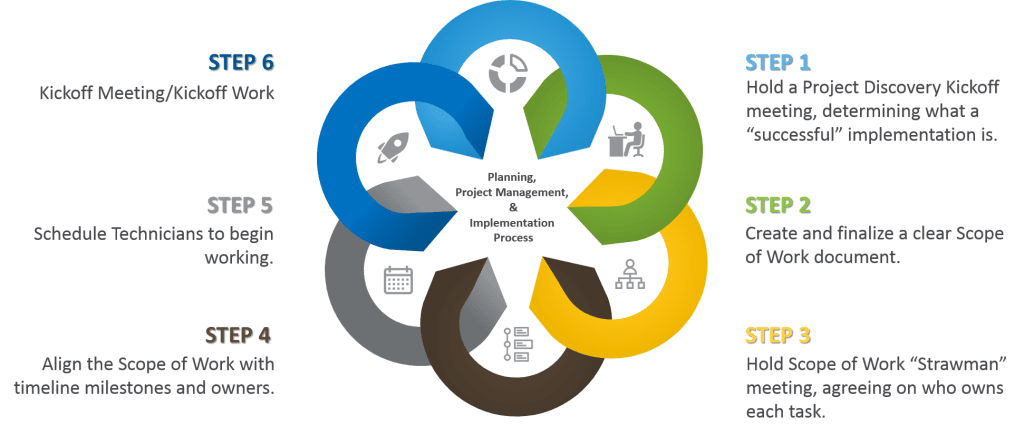A Buyer’s Guide to Evaluating Planning and Project Management for Phone System Implementations

Two Major Steps for a Successful Phone System Implementation
Planning, professional project management, and implementation is pivotal to a successful phone system launch. Whether you are choosing a cloud-based PBX, a hybrid solution, or a premise-based PBX, the success or failure of the project depends on the quality of project management and implementation support provided by your vendor. If these items aren’t covered in your proposal or are downplayed by your vendor, it is a huge red flag. These items mean the difference between a smooth launch of your new phones, and endless pain and suffering as you stumble through problem after problem.
How do you know if your vendor is offering a quality implementation plan and adequate project management? That’s where this article can help. In just a couple of minutes, you can learn everything you need to know to feel confident in choosing the right vendor and making sure your new phone project is a stunning success!
Step 1 Professional Project Management
Having a plan in place but no one to manage it just won’t cut it when it comes to phone system implementations. Project management ensures that both you and the phone provider have a clear cut understanding of the true scope of the project, which will allow for a successful implementation. For example, a project manager understands the “math” of a phone system implementation. They can say, “The time for an implementation is 5 Minutes/Phone X # of Phones = Labor Needed to Complete the Job.” They will also know how much time and personnel to add on for additional features and any unknown issues.

That being said, this equation isn’t the final number, as a qualified project manager knows that the equation will shift depending on what the office suite is being used for. For instance, if the office suite is being used as a Law Office with simple internal and external calling, the above equation will be accurate. However, if the suite is actually a college or corporate campus, the implementation will be far larger and take more time, due to the distances between phones and buildings. A knowledgeable project manager will have the expertise to determine how long and what challenges may arise in laying phones in an “enterprise” environment such as these.
Additionally, project managers have deep experience in nitty gritty details that may not be apparent to you or to their technicians. Project Managers have the knowledge to plan for unexpected minutiae, such as building access, badges, background checks, access to locked doors/offices, and more. They also have unsurpassed knowledge on network topology and configuration that you will have to do on you rend, including if you have POE ready and turned on, Dedicated Voice Plans built and turned on, and DHCP options for phones to book and register. And finally, they have knowledge and plans for any training that your business may need such as training (classroom style or one on one) receptionist training, call center training, IT Administrator training, and more.
In short, having a project manager is pivotal to mutual understanding of the Scope of Work (SOW) and time requirements of any given phone system implementation. Without a project manager to communicate between you and the phone provider, expectations may not be met and unexpected roadblocks are more likely to occur.
Step 2 Crafting and Adhering to a Project Plan
It’s hard to know what to look for when you’re reviewing a phone provider’s planning, project management, and implementation process. To help you get started, consider the below sections that Vertical recommends for a successful implementation.

Project Kickoff Discovery
Project Kickoff Discovery is a pivotal part of the implementation process. Different from “pre-purchase” discovery, which is when you discuss the scale and features of your phone system with a sales representative, Project Kickoff Discovery allows you to come to an agreed upon definition of success with your phone provider. The Project Kickoff Discovery should conclude with a sign off on what will be completed prior to you paying the bill and being a happy, referenceable customer.
The Project Kickoff Discovery can be broken into five sections. These sections don’t need to be completed all at once; many companies (such as Vertical Communications) will break them into three or four 1-hour meetings.
1 Overall Design and Configuration
During the Overall Design and Configuration Meeting you should work with your Project Manager to discuss details such as:
- Auto Attendants
- Call Flows
- Queues
- Groups
- Voicemail
- DIDs
- UC Clients
By the end of this meeting a broad definition of success should be completed, which should be used as the basis for the Scope of Work (SOW)/definition of success documentation.
2 Network Topology for Voice
During the Network Topology for Voice meeting, make sure to cover the following:
- POE
- VLAN Planning
- DHCP Options
- WAN Planning
- SIP Trunking
- SBCs
- Disaster Recovery
- Failover Planning
During this meeting is also necessary to schedule a Network Assessment, which must occur prior to the start of any of the other steps/meetings in the process. The Network Assessment will determine any issues that stand in the way of a successful implementation, and will allow the project manager to plan methods to create solutions for the problems.
3 Physical Installation
During the Physical Installation meeting, you and your project manager will discuss any roadblocks in the onsite set up as well as where physical devices and cords will be placed. You will also create a test plan and review any access issues that may arise. A good project manager will create a clear/simple checklist for the installers from this meeting. Make sure that your project manager reviews the following in your physical installation meeting:
- Phone placement on desks
- Wiring to PCs
- Wall Mounts
- Cord Patches
- Long Handset Cords
- Ethernet Connections
- Training Sheets
- Test Plans for Each Phone
- Locked Office Planning
- Janitorial Impact
- Badges
- Background Checks
- Physical Installation Checklist
4 Training Planning
Training is critical to ensure that all parties know how to manage and use their phone systems. This will guarantee that the implementation is successful. During the training planning meeting discuss what type of training is most appropriate for your company. Consider the following:
Training Options
- Onsite
- Remote
- Classroom style
- One-on-One
- Hybrid training
Training Materials
- Virtual Materials
- Printed Materials
- Cheat Sheets
Role Specific Training
- Receptionist Training Special Care
- Call Center Agent Training
- Call Center Supervisor Training
- IT Admin Training
5 Implementation “Gotchas”
Make certain that your Project Manager takes the time to consider what could go wrong. During this meeting, you should take time to play “what if,” which will help everyone see if you can find any other potential potholes and pitfalls that installers and users may run into.
Scope of Work Document
Once you’ve moved through project discovery, the project manager should write a clear and concise SOW document. The SOW will document all of the details required by you, the user, as well as what steps will be taken by the phone provider to bring the details to fruition. By clearly outlining the SOW, all parties will be on the same page and the implementation will be successful.
Scope of Work Strawman Document
In the SOW “Strawman” document, your project manager will work to plan out initial milestone definitions. Within this document you and your project manager will agree on who “owns” each of these milestones. This will eliminate confusion and ensure that someone is accountable for each task in your SOW.
Scope of Work Timeline
Once the milestones have been created, the project manager will align the milestones with an appropriate timeline. A meeting should be held around the finalized SOW milestones, owners, and timelines, ensuring that all parties are in agreement. These documents should be signed by all parties.
Scheduling
Now that all parties are on the same page and you have a clear cut definition of success your project manager can begin scheduling technicians to work. Scheduling should never take place prior to this point, as errors and miscommunications are likely to occur.
Kickoff Meeting
It’s time to get started! During the Kickoff meeting, your project manager should discuss any outstanding details. They should also arrange for a regular weekly project meeting, which will ensure that the cadence is continued, punch lists are used, and that there is a relationship check-in.
Throughout the project, additional check-ins should occur. Make certain that your project manager measures the work and then has a milestone check in. AT this point they should review any lessons learned, integrate solutions to lessons learned, implement new best (better) practices, and amend the SOW as needed. These check-ins should continue to occur until the project is complete.
Success Party/Meeting
The final step in any implementation is to have a success party/meeting. During this time you can wrap up the project, which will entail getting sign off and feedback in real time.
Wrapping Up
As you can see, selecting a phone provider that not only cares about the solution, but also about the final implementation and its success is pivotal. Utilizing a professional project manager will guarantee that your SOW is met, making sure you get the most out of your phone investment. Taking the time to plan the implementation will ensure that you receive a fully functioning system in a reasonable timeline, without experiencing any nasty surprises. So, when you’re selecting your phone system provider, take the time to discuss and review the planning, project management, and implementation process. If they’re skipping steps or unwilling to provide transparency in their processes, consider it a red flag- they may not be a good provider for your new phone system.
Are you looking for a new phone system solution? Vertical Communications can help. With decades of experience and solutions from Vertical Communications, Mitel, and Ericsson-LG, Vertical ensures that we can provide the right communications system for whatever your unique needs are.



